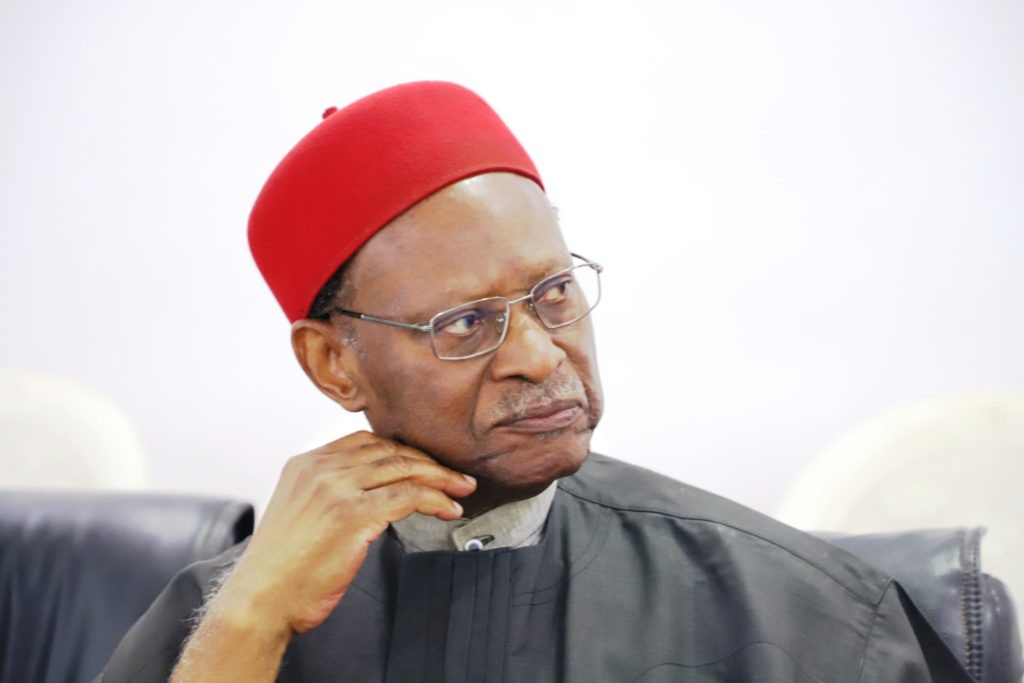Chief Emeka Anyaoku, former Secretary General of the Commonwealth, is one such Nigerian whose very name evokes reverence and a sense of pride in almost all Nigerian adult ears that hear it. Here is a Nigerian, who served for years at the zenith of global diplomacy, and yet no scandal, no blemish, nothing but the utmost respect, a complete symbol of Nigeria’s oneness as a nation, as a people. You can imagine my shock, then, when last week, a friend sent me a WhatsApp message with a link to a story titled: “With 1999 Constitution, Angel Gabriel won’t save Nigeria from miseries – Anyaoku” in the Vanguard newspaper of November 13, 2024.
Speaking as chairman of the occasion at a book launch on Wednesday, last week, Chief Anyaoku’s remarks are so weighty—and for me, disturbing—that they require being cited in full before any commentary on them. According to the retired diplomat, “The universal lesson is that pluralistic countries, which have survived as single political entities in unity and progress, are those that address their pluralism, that is, their diversity, with genuine federal constitutions. Examples of such countries are India, Canada and Switzerland. The other pluralistic countries, which failed to manage their pluralism with true federal constitutions, eventually disintegrated.
“Examples of these include Yugoslavia, which after 74 years of existence broke into seven sovereign states; Czechoslovakia, which separated to two independent states, East Timor, which separated from Indonesia, and coming nearer home here in Africa, Sudan, which broke into two separate countries after almost 3,000 years of existence as a country. I believe, therefore, that if our pluralistic Nigeria is to achieve true unity and political stability, and to successfully tackle the serious challenges that the country faces, it must have a truly federal constitution.”
He continued, “The divisiveness, the underperforming economy with the resultant massive poverty, the insecurity, the humongous corruption and the other major challenges currently facing Nigeria. My warning, therefore, is that for the sake of preserving our country, the federal government and National Assembly should not delay any longer acting to what is clearly a universal lesson. We must have a true Nigerian people’s democratic constitution based on the principles that underlie our 1960/63 Constitution, which was hence technically negotiated and agreed by the founding fathers of independent Nigeria.
- Obasanjo demands sack of INEC Chairman
- SOKOTO: SEN. WAMAKKO’S 9 YEARS OF POOR REPRESENTATION IN THE SENATE
“As many of us in this room will remember, Nigeria was more united, more stable, and developing towards achieving its potential after that constitution until the military intervened in governance in January 1966 and introduced a unitary constitution that has virtually existed, albeit in different forms, until today.”
Anyone reading this would remember having heard it several times before, except that in this case there are at least three problems with it. First, while it is true that there are many pluralistic societies in the world—all countries are pluralistic in some sense, with all due respect, there is no such a thing as a “universal lesson” about the constitutional or geopolitical structuring of countries anywhere on earth. All countries have evolved according to their own distinct situations, shaped, often, by centuries of specific social and political histories. Some pluralistic countries have federal constitutions, some do not. Nigeria is no exception; it just happens to be one of those pluralistic countries with a federal constitution, however “defective” it might be.
Britain, for example, which Chief Anyaoku would know more than anyone, is a pluralistic society of four nations and hundreds of ethnicities, all human races, religions and cultures. Yet, it is not a federation, and does not even have a “written constitution. Its monarch shares power with elected representatives in broad daylight; yet many, like Chief Anyaoku, would still call it “genuine” democracy. Nor is there anything as a “true federalism” anywhere. All federations in the world have their structural or constitutional defects that people just learn to live with, and still manage to build a country worthy of the name. In 2016, Donald Trump won the White House, not by winning a majority of America’s 150 million voters, but just 304 “electoral college” votes. What would Chief Anyaoku call such a democracy or such a federalism?
This is not a mere academic argument, however. To say that there is a certain “universal lesson” about the constitutional configuration of countries from which Nigeria deviates is to assert, precisely, that there is a certain cosmic law or logic in the structure of nations that Nigeria is defying, and that however long it takes, Nigeria will suffer the consequences, that is, eventually break-up. This is not what you expect to hear from a person who Nigeria, as presently constituted, has given everything there is to give to a single citizen.
Secondly, Chief Anyaoku invoked the events of first military intervention in Nigeria in January 1966, and recognised it as the moment in which a unitary constitution was imposed on Nigeria, variants of which, according to him, have been in force ever since. But he forgets, ignores, or glosses over the most important lessons of the very moment he cites. It was not just that the January 1966 coupists imposed a unitary structure on Nigeria that has remained ever since, it was also that to do so, they had to brutally kill several leaders of other peoples in a pluralistic Nigerian society, and the loss of those leaders remains, perhaps, the most catastrophic event to the people they represented in a federal Nigeria. For millions of those Nigerians, that loss is a far more important lesson than the imposition of a unitary constitution that soon followed it.
Moreover, it was the constant condemnation of the very “our 1960/63 Constitution” to use Anyaoku’s own words, which Nigeria had in place at the time, and which Chief Anyaoku would now like us to return to six decades after, that prepared the ground for those killings and the subsequent imposition of the very unitary constitution Chief Anyaoku now denounces. There is only a handful number of constitutional structures that a single country could adopt to move itself forward. In 60 years, Nigerians have called for nearly every single one of them, and then when it comes into force, they denounce it and call for yet another, in cyclical and aimless merry-go round of motion without movement. When will it ever stop? When will we ever become comfortable in our Nigerian skins, work with what we have, and build our country back better?
Chief Anyaoku who, by God’s Grace, has seen all of this motion without movement should know that what makes countries great does not necessarily lie in their constitutional structures, however “true” or “genuine”. What makes countries great beats in the human heart. It is the willingness to understand and accept difference. It is called tolerance. It is, as Sardauna once told the Great Zik, “let us not forget our differences, but let us understand them”. A pluralistic society can flourish regardless of its constitutional defects once the people can eschew that a political attitude of “my way or nothing”, “my person or nobody else”.
Perhaps this is where we arrive at the crux of the matter. Chief Anyaoku gives examples of countries like Yugoslavia, Czechoslovakia, East Timor, and South Sudan to explain the Nigerian constitutional situation. Why these countries? All of them are examples of irredentist success, though torrents of blood that flowed forth before these “constitutional successes” were achieved. So, if you read vague threats of Biafra in Chief Anyaoku’s remarks, I didn’t say so.

 Join Daily Trust WhatsApp Community For Quick Access To News and Happenings Around You.
Join Daily Trust WhatsApp Community For Quick Access To News and Happenings Around You.


